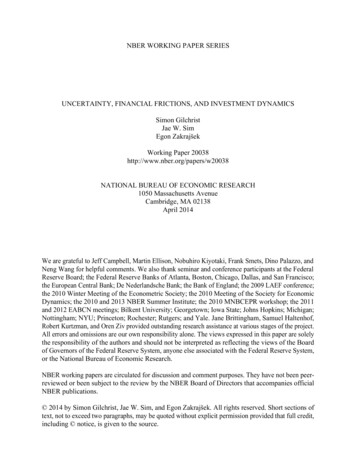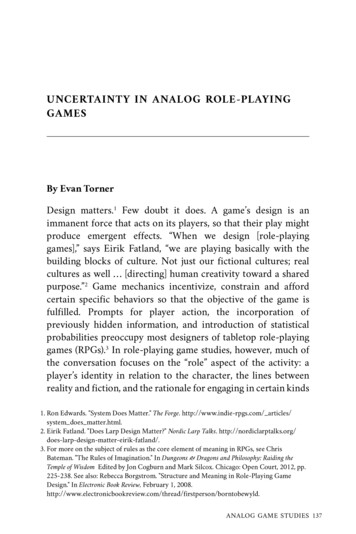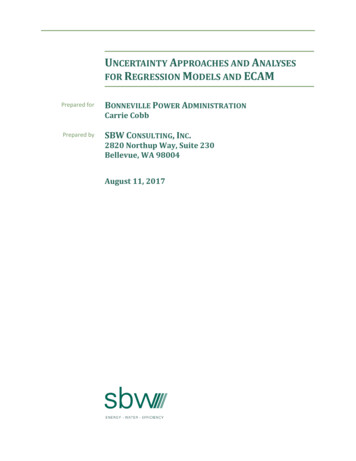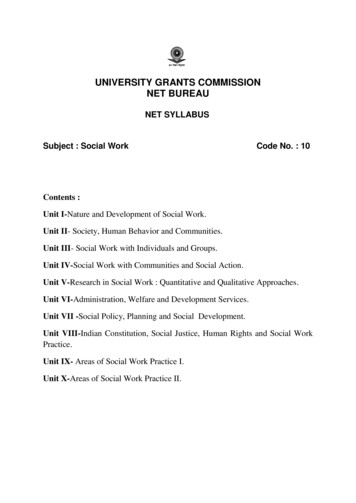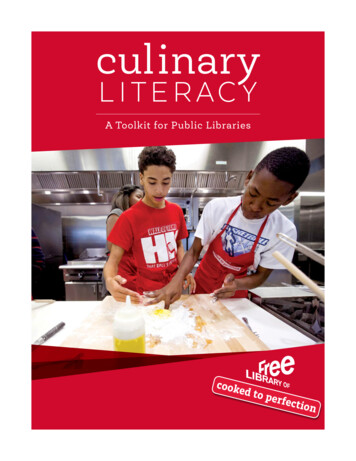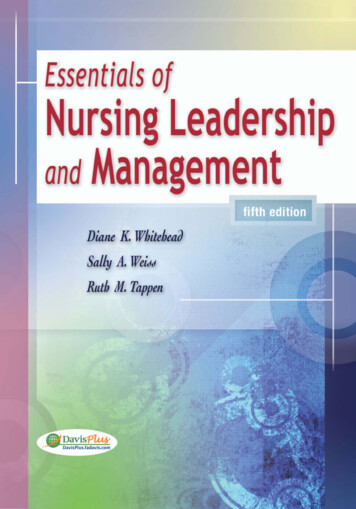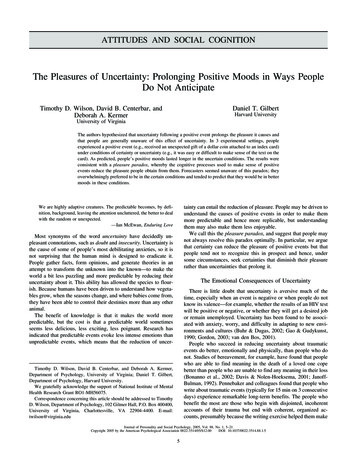
Transcription
ATTITUDES AND SOCIAL COGNITIONThe Pleasures of Uncertainty: Prolonging Positive Moods in Ways PeopleDo Not AnticipateTimothy D. Wilson, David B. Centerbar, andDeborah A. KermerDaniel T. GilbertHarvard UniversityUniversity of VirginiaThe authors hypothesized that uncertainty following a positive event prolongs the pleasure it causes andthat people are generally unaware of this effect of uncertainty. In 3 experimental settings, peopleexperienced a positive event (e.g., received an unexpected gift of a dollar coin attached to an index card)under conditions of certainty or uncertainty (e.g., it was easy or difficult to make sense of the text on thecard). As predicted, people’s positive moods lasted longer in the uncertain conditions. The results wereconsistent with a pleasure paradox, whereby the cognitive processes used to make sense of positiveevents reduce the pleasure people obtain from them. Forecasters seemed unaware of this paradox; theyoverwhelmingly preferred to be in the certain conditions and tended to predict that they would be in bettermoods in these conditions.tainty can entail the reduction of pleasure. People may be driven tounderstand the causes of positive events in order to make themmore predictable and hence more replicable, but understandingthem may also make them less enjoyable.We call this the pleasure paradox, and suggest that people maynot always resolve this paradox optimally. In particular, we arguethat certainty can reduce the pleasure of positive events but thatpeople tend not to recognize this in prospect and hence, undersome circumstances, seek certainties that diminish their pleasurerather than uncertainties that prolong it.We are highly adaptive creatures. The predictable becomes, by definition, background, leaving the attention uncluttered, the better to dealwith the random or unexpected.—Ian McEwan, Enduring LoveMost synonyms of the word uncertainty have decidedly unpleasant connotations, such as doubt and insecurity. Uncertainty isthe cause of some of people’s most debilitating anxieties, so it isnot surprising that the human mind is designed to eradicate it.People gather facts, form opinions, and generate theories in anattempt to transform the unknown into the known—to make theworld a bit less puzzling and more predictable by reducing theiruncertainty about it. This ability has allowed the species to flourish. Because humans have been driven to understand how vegetables grow, when the seasons change, and where babies come from,they have been able to control their destinies more than any otheranimal.The benefit of knowledge is that it makes the world morepredictable, but the cost is that a predictable world sometimesseems less delicious, less exciting, less poignant. Research hasindicated that predictable events evoke less intense emotions thanunpredictable events, which means that the reduction of uncer-The Emotional Consequences of UncertaintyThere is little doubt that uncertainty is aversive much of thetime, especially when an event is negative or when people do notknow its valence—for example, whether the results of an HIV testwill be positive or negative, or whether they will get a desired jobor remain unemployed. Uncertainty has been found to be associated with anxiety, worry, and difficulty in adapting to new environments and cultures (Buhr & Dugas, 2002; Gao & Gudykunst,1990; Gordon, 2003; van den Bos, 2001).People who succeed in reducing uncertainty about traumaticevents do better, emotionally and physically, than people who donot. Studies of bereavement, for example, have found that peoplewho are able to find meaning in the death of a loved one copebetter than people who are unable to find any meaning in their loss(Bonanno et al., 2002; Davis & Nolen-Hoeksema, 2001; JanoffBulman, 1992). Pennebaker and colleagues found that people whowrite about traumatic events (typically for 15 min on 3 consecutivedays) experience remarkable long-term benefits. The people whobenefit the most are those who begin with disjointed, incoherentaccounts of their trauma but end with coherent, organized accounts, presumably because the writing exercise helped them makeTimothy D. Wilson, David B. Centerbar, and Deborah A. Kermer,Department of Psychology, University of Virginia; Daniel T. Gilbert,Department of Psychology, Harvard University.We gratefully acknowledge the support of National Institute of MentalHealth Research Grant RO1-MH56075.Correspondence concerning this article should be addressed to TimothyD. Wilson, Department of Psychology, 102 Gilmer Hall, P.O. Box 400400,University of Virginia, Charlottesville, VA 22904-4400. E-mail:twilson@virginia.eduJournal of Personality and Social Psychology, 2005, Vol. 88, No. 1, 5–21Copyright 2005 by the American Psychological Association 0022-3514/05/ 12.00DOI: 10.1037/0022-3514.88.1.55
6WILSON, CENTERBAR, KERMER, AND GILBERTsense of their negative experiences (Pennebaker, 1997a, 1997b;Smyth, 1998).However, is it always desirable to reduce uncertainty by makingsense of life events? Mysticism, the idea that there is a divinepresence beyond human understanding, is a recurrent theme inmost world religions and embodies the idea that a tolerance foruncertainty is a necessary part of religious faith. The Taoist philosopher Lao Tzu advised, “Stop thinking, and end your problems”(Mitchell, 1996, p. 20). John Keats, in a letter to his brothers,suggested that artistic achievement occurs when people are “capable of being in uncertainties, Mysteries, doubts, without anyirritable reaching after fact & reason” (Bush, 1959, p. 261). Pennebaker (1997a) argued that romantic infatuations last longer whenthey involve a degree of uncertainty and lack of understanding.Clore and Colcombe (2003) suggested that uncertainty about thesource of positive affect leads to a general sense of well-being,whereas “constraining” the affect to a specific source reduces asense of general well-being. Consistent with these approaches, weargue that uncertainty about the nature of a positive event canprolong the pleasure people derive from it and, further, that peopledo not recognize this fact.Sense Making and Emotional AdaptationThe present hypotheses were derived from a model of emotionaladaptation outlined by Wilson and Gilbert (2003) and Wilson,Gilbert, and Centerbar (2003). The basic premise is that peoplemake sense of their worlds in a way that speeds recovery fromemotional events and that this sense-making process is largelyautomatic and nonconscious. These processes are described by theacronym AREA: attend, react, explain, adapt. People attend ororient to novel, relevant events; they react emotionally to theevents; they explain or make sense of the events; and as a resultthey adapt to them, in that they think about them less and have aless intense emotional reaction when they do.There is substantial evidence that people and other animalsattend to novel, unexpected events (e.g., Anderson, 1994; Cheal,Johnson, Ellingboe, & Skupny, 1984; Hilgetag, Lomber, & Payne,2001; Sokolov, 1963; Vinogradova, 2001; Wechsler, 1992). Anorienting response has been found in infants and adults on a widevariety of cognitive tasks and on various measures of brain activity(e.g., Donchin, 1981; Enns, Austen, Di Lollo, Rauschenberger, &Yantis, 2001; Fantz, 1964; Hamann, Ely, Hoffman, & Kilts, 2002;Johnston & Schwarting, 1997; Kimmel, Van Olst, & Orlebeke,1979; Quinn, Eimas, & Tarr, 2001; Spencer, Dien, & Donchin,2001). It is not novelty or unexpectedness per se that causes anorienting response; there are always thousands of novel and unexpected events in people’s environments that fail to attract attention (e.g., clouds that are in a pattern never seen before). Instead,people orient to unexpected events that are relevant to their goals(e.g., a weather forecaster’s attention is more likely to be drawn toa novel pattern of clouds; Ben-Shakhar, Asher, Poznansky-Levy,Asherowitz, & Lieblich, 1989; Bernstein, 1969; Maltzman, 1979).Theories of cognitive expectancies make a similar point, namely,that disconfirmations of important expectancies lead to increasedattention to and processing of the inconsistent information (e.g.,Olson, Roese, & Zanna, 1996).Once people attend to unexpected relevant events, they reactwith relatively intense emotions (Ortony, Clore, & Collins, 1988).Evidence for this hypothesis comes from several sources. Mellers,Schwartz, and Ritov (1999) found that people had more extremeemotional reactions to winning and losing gambles when theoutcome was of low probability. The more unexpected the event,the stronger the emotional reaction to it. At a physiological level,reward pathways in the brain, such as dopaminergic neurons, areactivated not by the valence of a stimulus but by its lack ofpredictability (Berns, McClure, Pagnoni, & Montague, 2001;Schultz, Dayan, & Montague, 1997). Further, unexpected eventstend to increase people’s physiological arousal (e.g., Berlyne,1960; Le Poire & Burgoon, 1996; Price & Geer, 1972), and thisarousal is likely to intensify emotional reactions to the events(Schachter & Singer, 1962; Zillmann, 1978).When people orient and react emotionally to an event, theyattempt to explain or make sense of it, quickly and automatically.Mandler (1975) equated attention with the analysis of meaning:“Any input to the cognitive–interpretive system is subjected to ananalysis of its relation to existing structures” (p. 26). People oftenmake sense by trying to determine the cause of the event; forexample, people attempt to explain each other’s behavior in orderto be able to predict future behavior (Gilbert, 1998; Heider, 1958;E. E. Jones & Davis, 1965; Kelley, 1967). As Heider (1958) noted,people make causal attributions “not only because of intellectualcuriosity” (p. 146) but because explaining the causes of eventsallows them to understand their world and gain a sense that theycan predict and control what happens to them. In short, peoplereduce uncertainty by making sense of events, which can involvecausal attribution, assimilation to existing knowledge structures, oraltering knowledge structures to accommodate the events.Once people succeed in making sense of an event, it no longerseems as surprising or unexpected, and as a result people adapt toit emotionally. Research on the hindsight bias, for example, hasfound that after people have explained an event, it seems morepredictable than it did in advance (Fischhoff, 1975; Roese &Olson, 1996). Sense making reduces the emotional power ofevents by turning extraordinary, attention-demanding events intoordinary ones that are no longer focal in people’s thoughts and nolonger trigger intense reactions. There are at least two mechanismsby which adaptation occurs (Wilson et al., 2003; Wilson & Gilbert,2003). First, an emotional event becomes less cognitively accessible to people once it has been transformed from an unexpected,attention-grabbing one into an understandable, predictable one.Second, holding accessibility constant, unexpected, unexplainedevents trigger more intense emotional reactions than expected,explainable ones for the reasons outlined above (e.g., unexpectedevents trigger more arousal).Sense making is desirable when people experience negativeevents because it speeds recovery from such events. Pennebaker’s(1997a) writing exercise, for example, helps people make sense oftraumas, such that these events no longer dominate their thoughtsor trigger intense emotional reactions. The downside of sensemaking, however, is that it also speeds “recovery” from positiveevents.The purpose of the present studies was not to test the entireAREA model of emotional adaptation but rather to test one clearimplication of it: If sense making reduces the pleasure peoplederive from positive events, then this pleasure could be prolongedby inhibiting their ability to make sense of such events. We testedthis prediction in the present studies by manipulating how easily
THE PLEASURES OF UNCERTAINTYpeople could make sense of positive events. We predicted that thepleasure people derived from the events would last longer in theconditions in which people had difficulty making sense of them,which we refer to as the “pleasure of uncertainty” hypothesis. Themain goal of the present research was to test this hypothesis inseveral settings, including field and laboratory studies. We alsogathered preliminary evidence for some of the variables that mightmediate the pleasure of uncertainty, such as the aforementionedpossibility that once people have made sense of an event it seemsless surprising and more mundane.Affective Forecasting: Misunderstanding the PleasureParadoxIf people understood the pleasure paradox, they might makeconscious decisions about how to manage their emotions, such astrading off uncertainty for prolonged pleasure. People might opt toremain uncertain about pleasurable events by, for example, notwatching the last few minutes of a movie that they know will havea happy ending. There is reason to believe, however, that peopleare not very cognizant of how quickly they will “recover” frompleasurable events by making sense of them. In general, peoplehave poor access to the psychological processes by which theyregulate their emotions and make sense of the world (Lazarus,1999; Nisbett & Wilson, 1977; Wilson, 2002); thus, they may beunaware of the extent to which they will engage in uncertaintyreduction when faced with unexpected events and the extent towhich this uncertainty reduction will moderate their emotionalreactions. People have a general sense, of course, that pleasurefades over time; they know that the thrill of a new romance doesnot last forever and that the excitement of buying a new car fadeseventually, but people may not recognize the speed with whichsuch adaptation occurs and the extent to which it results from sensemaking.Underestimating sense making may be a major cause of theimpact bias, the tendency to overestimate the enduring impact thatfuture events
Department of Psychology, Harvard University. We gratefully acknowledge the support of National Institute of Mental Health Research Grant RO1-MH56075. Correspondence concerning this article should be addressed to Timothy D. Wilson, Department of Psychology, 102 Gilmer Hall, P.O. Box 400400, University of Virginia, Charlottesville, VA 22904-4400. E-mail:
